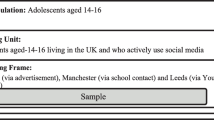Abstract
This brief report describes an exploratory qualitative study that examined online narratives of non-suicidal self-injury (NSSI) in the context of critical developmental tasks of early adulthood: the development of self and identity. Thematic analyses of online autobiographical accounts of NSSI suggest that self and identity processes that are particularly relevant in early adulthood may contribute to vulnerability to NSSI. Specifically, NSSI may provide a source of self-identification in the service of developing self-identity and a community of others with whom to identify, a means for managing negative emotions specifically related to negative self-concept, and it may provide a basic sense of a coherent self who persists across time. Implications are discussed with respect to research, clinical practice, and prevention, with a particular emphasis on the Internet as a context for early adult development.
Similar content being viewed by others
References
Adler, P., & Adler, P. (2011). The tender cut: Inside the hidden world of self-injury. New York: NYU Press.
Arnett, J. J. (2000). Emerging adulthood. A theory of development from the late teens through the twenties. American Psychologist, 55, 469–480.
Braun, V., & Clarke, V. (2006). Using thematic analysis in psychology. Qualitative Research in Psychology, 3, 77–101.
Chandler, M. J., Lalonde, C. E., Sokol, B. W., & Hallett, D. (2003). Personal persistence: Identity development and suicide: A study of Native and non-Native North American adolescents. Monographs of the Society for Research in Child Development, 68, Vii–130.
Erikson, E. (1968). Identity youth and crisis. New York: W. W. Norton.
Harter, S. (2012). The construction of the self: Developmental and sociocultural foundations (2nd ed.). New York: Guilford Press.
Harter, S., & Monsour, A. (1992). Developmental analysis of conflict caused by opposing attributes in the adolescent self-portrait. Developmental Psychology, 28, 251–260.
International Society for the Study of Self-Injury. (2007) Non-suicidal self-injury. Retrieved from: www.isss-web.org.
Klonsky, E. D. (2007). Non-suicidal self-injury: An introduction. Journal of Clinical Psychology, 63, 1039–1043. doi:10.1002/jclp.20411.
Klonsky, E. D. (2009). The functions of self-injury in young adults who cut themselves: Clarifying the evidence for affect-regulation. Psychiatry Research, 166, 260–268.
Klonsky, E. D., Muehlenkamp, J. J., Lewis, S. P., & Walsh, B. (2011). Non-suicidal self-injury. Cambridge: Hogrefe and Huber MA.
Leary, M. R., & Tangney, J. P. (2003). The self as an organizing construct in the self and behavioral sciences. In M. R. Leary & J. P. Tangney (Eds.), Handbook of self and identity (pp. 3–14). New York: Guilford.
Lewis, S. P., & Baker, T. G. (2011). The possible risks of self-injury websites: A content analysis. Archives of Suicide Research, 15, 390–396. doi:10.1080/13811118.2011.616154.
Lewis, S. P., Heath, N. L., Michal, N., & Duggan, J. M. (2012a). Non-suicidal self-injury, youth and the Internet: What mental health professionals need to know. Child and Adolescent Psychiatry and Mental Health,. doi:10.1186/1753-2000-6-13.
Lewis, S. P., Heath, N. L., Sornberger, M. J., & Arbuthnott, A. E. (2012b). Helpful or harmful? An examination of viewers’ responses to non-suicidal self-injury videos on YouTube. Journal of Adolescent Health,. doi:10.1016/j.jadohealth.2012.01.013.
Lewis, S. P., Heath, N. L., St. Denis, J. M., & Noble, R. (2011). The scope of non-suicidal self- injury on YouTube. Pediatrics, 127, e552–e557. doi:10.1542/peds.2010-2317.
Lincoln, Y., & Guba, E. (1985). Naturalistic inquiry. New York: Sage.
McLean, K. C., Breen, A. V., & Fournier, M. A. (2010). Constructing the self in middle adolescent boys: Narrative identity, individuation and well-being. Journal of Research on Adolescence, 20, 166–187.
McLean, K. C., Wood, B., & Breen, A. V. (in press). Reflecting on a difficult life: Narrative construction in vulnerable adolescents. Journal of Adolescent Research.
Nock, M. K., & Favazza, A. R. (2009). Non-suicidal self-injury: Definition and classification. In M. K. Nock (Ed.), Understanding non-suicidal self-injury: Origins, assessment, and treatment (pp. 65–78). Washington: American Psychological Association.
Patton, M. Q. (2002). Qualitative research and evaluation methods. Thousand Oaks: Sage.
Selman, R. L. (2003). The promotion of social awareness: Powerful lessons from the partnership of developmental theory and classroom practice. New York: Russell Sage Foundation.
Whitlock, J., Powers, J. L., & Eckenrode, J. (2006). The virtual cutting edge: The internet and adolescent self-injury. Developmental Psychology, 42, 407–417.
Acknowledgments
We wish to thank Thomas G. Baker for his assistance with data collection and Thiago Kurtz and Kate McLean for their helpful critiques of an earlier draft of this paper.
Author information
Authors and Affiliations
Corresponding author
Rights and permissions
About this article
Cite this article
Breen, A.V., Lewis, S.P. & Sutherland, O. Brief Report: Non-suicidal Self-injury in the Context of Self and Identity Development. J Adult Dev 20, 57–62 (2013). https://doi.org/10.1007/s10804-013-9156-8
Published:
Issue Date:
DOI: https://doi.org/10.1007/s10804-013-9156-8




